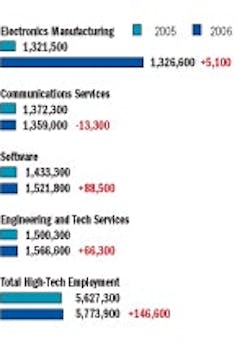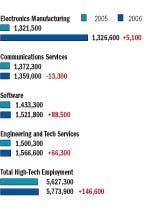U.S. high-tech manufacturing sees first job gains since 2000
The 10th annual edition of Cyberstates: a Complete State-by-State Overview of the High technology Industry, published by the American Electronics Assn. (AEA), reports that 2006 marked the third-consecutive year of overall employment gains in software services and engineering and tech servicesthe industrys two strongest sectors. The report finds high-tech manufacturing added jobs for the first time since 2000, with total U.S. high-tech industry employment at 5.77 million in 2006, up by 146,600 from 5.63 million in 2005.
The unemployment rate for computer and math occupations fell to 2.5% in 2006, while the unemployment rate for electrical engineers rose slightly, but remained significantly low at 1.9%. The unemployment rate for computer and information systems mangers dropped further to 2.3% in 2006 from 2.7% in 2005.
U.S. high-tech workers were paid an average of $75,500 in 2005, the most recent data available for the tech industry. High-tech wages were 86% more on average than the private sector, $75,500 vs. $40,500.
Software service employees earned higher average wages than their counterparts in technology manufacturing, $83,600 compared to $77,600.


